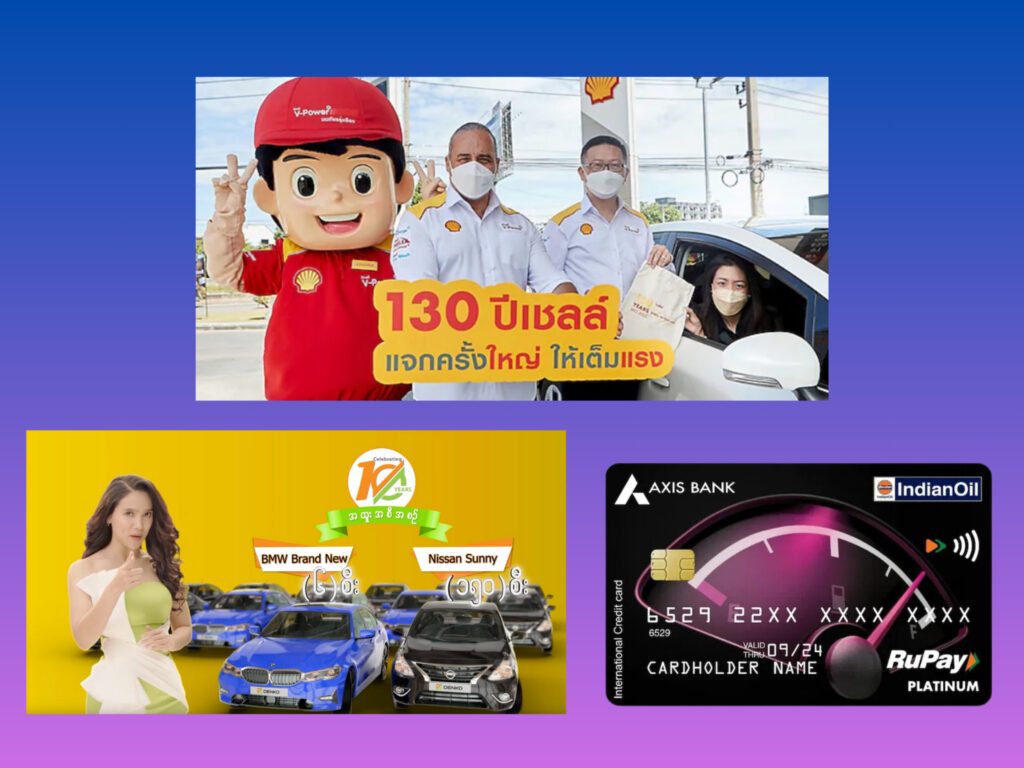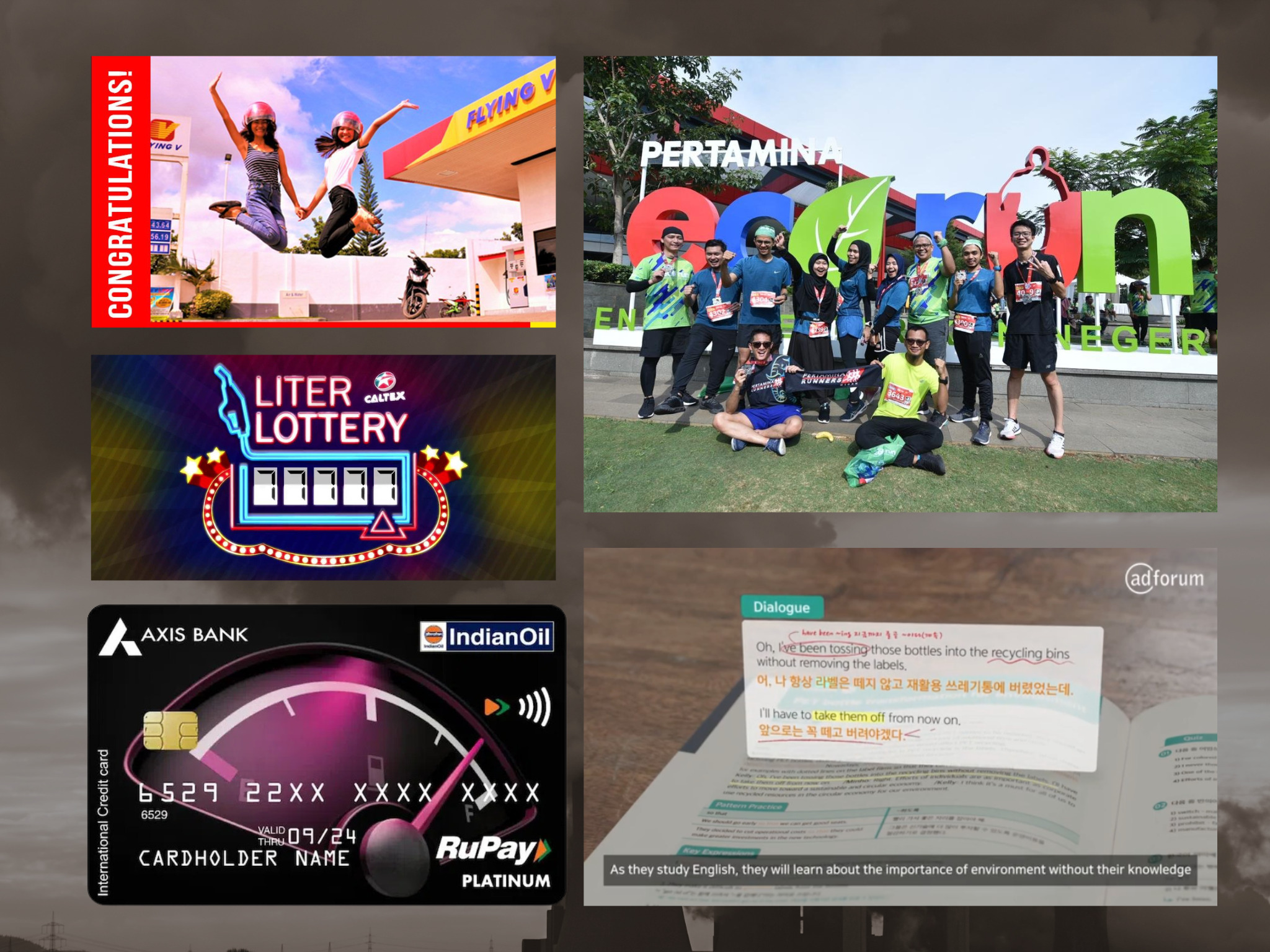The Asia F-List: How Fossil Fuel Companies are Gaslighting Asians with Greenwashing Campaigns
6 Mins Read
A new report by marketing activism group Clean Creatives explores how Asia’s fossil fuel industry is failing communities in the region, using greenwashing techniques to shift the blame from its climate impacts. These include loyalty credit cards, lotteries, prize draws, social media campaigns, and PR initiatives.
Clean Creatives, a global initiative to end the communication, marketing and PR sector’s links with the fossil fuel industry, has published its Asia F-List. It documents the companies that choose to keep working with fossil fuel firms despite the glaring evidence of their impact on ecological destruction.
In 2021, for instance, fossil fuel companies were responsible for 90% of all carbon emissions globally. The impact of climate change is obviously being felt everywhere, but the Global South is much more adversely affected, with the Global North being responsible for a higher amount of fossil fuel emissions. In Asia, Singapore is heating up two times faster than the rest of the world, cities are facing alarmingly rising sea levels, and pollution contributes to nearly 2.4 million deaths in India and 2.2 million in China each year.
However, Asia is the fastest-growing region for fossil fuel production and consumption, and its contribution to the planet’s GHG emissions has doubled from 22% in 1990 to 44% in 2019 – faster than the global average.
The Asia F-List covers Hong Kong, India, Indonesia, Japan, Malaysia, Myanmar, the Philippines, Singapore, South Korea, Thailand and Vietnam. China was excluded due to “the unique corporate ownership structures and state of media transparency” making it difficult to evaluate the role of fossil fuels there.
It found that British agency WPP has the most contracts with fossil fuel firms than any other holding company (22), followed by New York-headquartered IPG (9). In terms of independent agencies, Indonesia’s Kiroyan Partners has the most contracts at nine.
Indonesia is also the country with the highest number of fossil fuel contracts, with 15. It’s followed by India (11), Thailand (9), Japan (8), Singapore (6), Philippines (6), Malaysia (5), Korea (4), Vietnam (2) and Hong Kong (2).
The report divided campaigns by major polluters into two categories: incentives to buy more, and ‘purpose-washing’.
Credit cards and giveaways to incentivise buying more fuel

Oil and gas companies in Asia use various techniques to reward customer loyalty. In India, for example, “almost every major fuel provider has multiple credit card schemes with different banks, vehicle manufacturers and non-banking financial companies”. When customers spend on fuel, they earn reward points that can be used on future fuel and other purchases – and many sign up for these cards based on their existing relationship with banks.
These cards exist in multiple countries, including Thailand, the Philippines and Japan. In the latter, Cosmo Oil’s Eco Card claims to “convert brand loyalty to environmental action” by donating 0.1% of your fuel or car wash bill, plus ¥500 ($3.64), every year to an environmental conservation fund. “Promoting these cards as a sustainable solution could just be more greenwashing,” the report states.
In addition, some companies use prize campaigns and TV events to incentivise loyalty, “an easy PR tactic for oil and gas companies to improve their reputation and distract from other issues”. In Thailand, for example, Shell organised a 130th Anniversary Mega Lucky Draw through which consumers could win a Porsche car, BMW motorbikes, gold bars, gold necklaces and fuel gift cards – provided they make a purchase at a Shell station.
In Myanmar, to celebrate its 10th anniversary, Denzo’s Lucky Draw programme hosted a giveaway of BMW and Nissan cards, which was broadcast as a celebrity-hosted live TV event with an awards ceremony. To enter the competition, customers needed to spend money on fuel, with one entry for every 10,000 Kyat ($5) spent.
And in the Philippines, Caltex (the APAC brand name for Chevron) organised a Liter Lottery campaign, offering people a free tank of gas if the last digit of the metre matched the last digit of their car’s license plate, leading to a 233% increase in full tank purchases and 198% sales rise. Another fuel company, Seaoil, launched a nationwide campaign – now in its sixth year – where one could win a free lifetime supply of gas.
Purpose-washing customers to distract from fossil fuels’ climate damage
Fossil fuel companies use marketing and PR campaigns to lead people into believing they’re doing good for the planet and society, which encourages customers to feel personally responsible for the climate crisis and take individual action to clean up the sector’s mess.
In South Korea, GS Caltex and ad agency Ideot created an English-language workbook to promote consumer-focused solutions in line with the company’s ‘green supply chain’. They replaced normal text with case studies to show how people can help the environment, distributing the workbook in bookstores and study cafés.
India’s Adani Group released a #ICan campaign in 2021 to urge people to lower their climate impact by asking questions like “Can you lower your carbon footprint?” and “Can you be a partner in fighting global warming?”, deflecting from answering those questions itself. “This type of greenwashing is so insidious and deceptive that it’s even won Adani multiple awards,” states the report.
In Japan, ENEOS launched a broadcast radio show called For Our Earth: One By One to spread awareness about decarbonisation and recycling. Tapping actress Akane Hotta as the host, it sees celebrities learn how we can meet the UN Sustainable Development Goals. Clean Creatives writes: “This seems to be an example of virtue signalling — indicating ENEOS’ values without considering whether the company is behaving in service of them.”
Indonesia’s Pertamina, meanwhile, runs an Eco RunFest every year, claiming that ticket purchases go towards an initiative helping rural areas use clean energy and improve welfare. But to enter, people need to make a fuel purchase. The company claims that by buying “higher-quality and environmentally friendly fuel”, people can use reward points to get a voucher code and register for the event.
“Their claim that fossil fuels are environmentally friendly is greenwash, but the requirement for people to purchase fuel before participating in an event billed to be “Healthy for Earth” is misleading marketing at its finest,” the report says.
Moreover, some companies organise purpose-washing field trips to show they’re going to local villages and giving back to the less fortunate. In 2018, Shell, Chevron and the international NGO Pact in Myanmar set up the Ahlin Yaung campaign to fund renewable energy and solar projects in 70 villages without electricity, despite Shell being expected to spend $1.2B in offshore exploration and making a profit of $20.7M before tax in 2021 (which is when it ceased operations in the country).
Similarly, PTT and marketing agency CJ Worx planted mangroves in three Thai provinces to restore ecosystems damaged by climate change, “which is ironic since fossil fuel projects would have contributed to that situation”.
Greenwashing the TikTok generation
Fossil fuel corporations are also using social media to go viral among younger populations. In March last year, Caltex and ad firm VMLY&R announced the #CaltexUnstoppableStar rap challenge, featuring rappers from multiple Asian countries. It released a rap song and encouraged people to sing along and create their own videos using AR filters to win prizes like Caltex’s Starcash reward points, a fuel system cleaner and an iPad. Caltex says the campaign received 650 million views within the first 10 days.
In the Philippines, Flying V released two social media challenges. The first, Mr. and Mrs. Flying V, was a TikTok dance challenge inviting people to share videos of them dancing at the gas station, while the Lipad Jump Shot photo challenge asked consumers to share images of them jumping next to a station. But to participate, they had to make a fuel purchase of over PHP 100 ($1.79), with one entry per purchase, encouraging people to spend more to up their chance of winning a PHP 10,000 ($179) cash prize.
The report makes for grim reading, but despite that, its authors believe change is imminent. It cites two agencies that have signed its Clean Creatives pledge, Vero and On Purpose, which joined forces to build a sustainability-focused business pipeline between India and Southeast Asia.
The authors conclude: “We believe we’re at the beginning of a significant cultural shift in the industry and world. People and companies across Asia are advocating for better sustainability regulations, disclosures and education and new alliances are making sustainability a requirement in the marketing and communications industry.”




